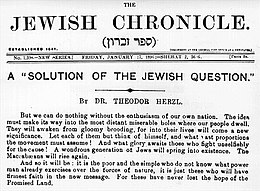Wikipedia: Zionism (
Hebrew: צִיּוֹנוּת
Tsiyyonut [tsijoˈnut] after
Zion) is both an
ideology[1][2][3] and
nationalist[fn 1] movement among the
Jewish people that espouses the re-establishment of and support for
[6] a
Jewish state centered in the area roughly corresponding to
Canaan, the
Holy Land, or the region of
Palestine.
[7][8][9][10][11] Modern Zionism emerged in the late 19th century in
Central and
Eastern Europe as a national revival movement, both in reaction to newer waves of
antisemitism and as a response to
Haskalah, or Jewish Enlightenment.
[12][13][14] Soon after this, most leaders of the movement associated the main goal with creating the desired state in Palestine, then an area controlled by the
Ottoman Empire.
[15][16][17]
Front page of
The Jewish Chronicle, 17 January 1896, showing an article by
Theodor Herzl (the father of political Zionism) a month prior to the publication of his pamphlet
Der Judenstaat
Theodor Herzl was the founder of the Modern Zionist movement. In his 1896 pamphlet
Der Judenstaat, he envisioned the founding of a future independent Jewish state during the 20th century.
Zionism posited a
negation of Jewish life in the
diaspora and, until 1948 perceived its primary goal as an ideal
ingathering of exiles (kibbutz galuyot) in the ancient heartland of the Jewish people,
[18] and, through the establishment of a state, the liberation of Jews from the
persecutions, humiliations, discrimination and
antisemitism they had been subject to. Since the establishment of the
State of Israel in 1948, Zionism has continued primarily to advocate on behalf of Israel and to address threats to its continued existence and security.[
citation needed]
A religious variety of Zionism supports Jews upholding their Jewish identity defined as adherence to religious Judaism, opposes the assimilation of Jews into other societies, and has advocated the
return of Jews to
Israel as a means for Jews to be a majority nation in their own state.
[8] A variety of Zionism, called
cultural Zionism, founded and represented most prominently by
Ahad Ha'am, fostered a
secular vision of a Jewish "spiritual center" in Israel. Unlike Herzl, the founder of political Zionism, Ahad Ha'am strived for Israel to be "a Jewish state and not merely a state of Jews".
[19]
Advocates of Zionism view it as a national
liberation movement for the repatriation of a persecuted people residing as minorities in a variety of nations to their ancestral homeland.
[20][21][22] Critics of Zionism view it as a
colonialist,
[23] racist[24] and
exceptionalist[25] ideology that led advocates to
violence during
Mandatory Palestine, followed by the
exodus of Palestinians, and the subsequent denial of their right to
return to lands and property lost during the 1948 and 1967 wars.
[26][27][28][29]
1


